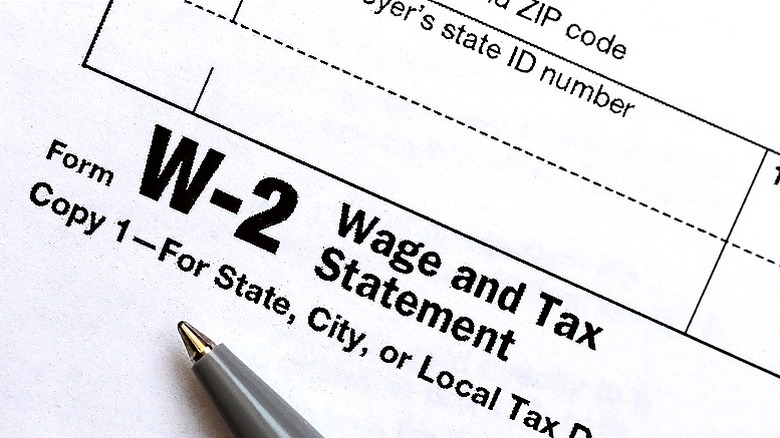Don't Fall For These Social Media Tax Schemes Or You Might Get Audited
If you didn't already know, the IRS monitors TikTok. It sees the same tips, tricks, and downright incorrect tax information going around on social media and it has a warning for you: Don't do it. Every year, the IRS compiles its annual Dirty Dozen, a list of 12 common scams and tax schemes that can negatively impact taxpayers. From losing money to increasing the risk of stolen personal data, these tax schemes can cause a lot of damage to unsuspecting filers who might think they've discovered the next big lucrative trick to filing their income taxes. Among the potential schemes included in the 2023 Dirty Dozen list was a warning about trusting tax advice learned on social media.
The IRS reported a fair amount of inaccurate information on social media, either as intentionally fraudulent information from scammers or simply due to misguided and incorrect tax knowledge. IRS Commissioner Danny Werfel warned, "The IRS continues to see a lot of inaccurate information that could get well-meaning taxpayers in trouble. People should remember that there is no secret way to fill out a form and simply get a larger refund that they aren't entitled to. Remember, if it sounds too good to be true, it probably is."
Whether you've personally watched videos about tax filing techniques or have heard advice from a friend about a social media tip, it's best to verify the information before you wind up in trouble. Here are two important tax schemes shared on social media to avoid this tax season.
Form 8944 fraud
There are various tax return red flags to steer clear of if you wish to avoid a potential audit by the IRS. With that in mind, one of the specific schemes the IRS actually called out concerns Form 8944, also known as the Preparer e-file Hardship Waiver Request. Social media posts have suggested that regular taxpayers can claim Form 8944 to receive a refund from the IRS — even in cases where the taxpayer has a due balance.
However, Form 8944 (while a legitimate form) is only usable by tax professionals, aka people who are paid to prepare and file tax returns on behalf of taxpayers. Tax preparers typically use Form 8944 to request an exemption that lets them file paper tax returns instead of electronic returns on behalf of their clients in cases of economic hardship. Contrary to what social media might say, an individual taxpayer attempting to file this form could face civil and/or criminal penalties.
If you're concerned about any past errors, remember the IRS allows you to amend previous returns and filings. Consulting a tax professional can also prove a smart choice if you're unsure about filing irregularities. For those experiencing financial difficulties but who owe the IRS money from back taxes, there is an option to expedite your return. Similarly, taxpayers can file Form 4868 to give them more time to file their return. There's also the option to request a "currently not collectible" filing status, which can allow taxpayers to pause their debt collection until they're able to pay what they owe.
Form W-2 fraud
Another popular social media scheme involves using tax software to falsely inflate your tax refund. (Note, this particular scheme is generally being promoted by scam artists rather than someone who might simply be unknowledgeable about tax procedures.) In this scheme, taxpayers are instructed to fill out their returns using entirely made-up amounts for both their income and reported withholding. By inflating these numbers, the scam claims that a taxpayer can ensure a large tax refund due to the incorrectly large amount of withholding they report. Using a fake income can also be seen as a way to take advantage of tax credits like the Earned Income Tax Credit (EITC) or the Additional Child Tax Credit (ACTC).
It's important to realize that this tax return scheme, in particular, is on the IRS' radar so using the tactic could lead to some significant penalties. Since the IRS works with payroll companies, its own Security Summit partners, and also with the Social Security Administration to verify all filed W-2 information, the IRS is more than likely going to discover attempted fraudulent filings.
In addition to facing potential audits and further investigation, making a false claim on your tax return and/or receiving a refund based on fraudulent information can lead to IRS fines and even jail time. However, the long-term penalties can be even more financially devastating with some scam victims reporting they also lost their Social Security, veterans, and low-income housing benefits.


